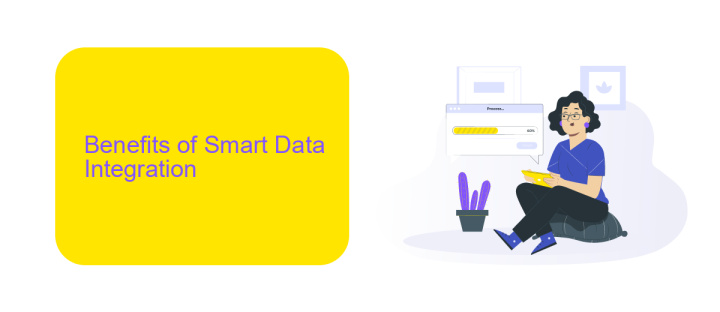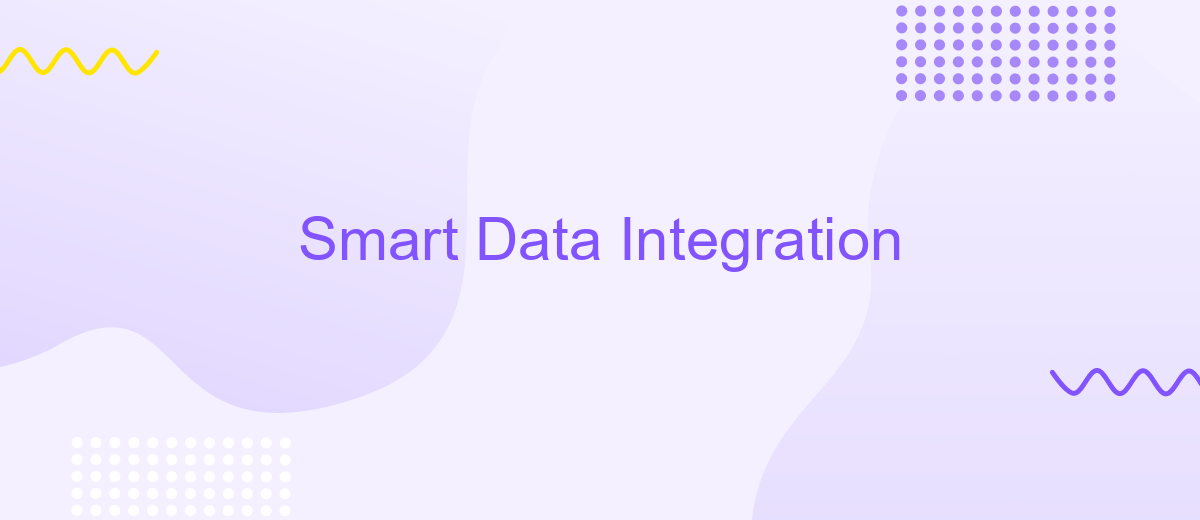Smart Data Integration
Smart Data Integration is revolutionizing how businesses manage and utilize data. By seamlessly combining data from various sources, it provides a unified view that enhances decision-making, improves efficiency, and drives innovation. This advanced approach leverages cutting-edge technologies like AI and machine learning to ensure data accuracy, relevance, and timeliness, making it an indispensable tool in today's data-driven world.
Introduction
Smart Data Integration is a crucial aspect of modern business operations, enabling seamless communication and data flow between disparate systems. This process ensures that data is accurate, consistent, and readily available, enhancing decision-making and operational efficiency.
- Streamlined data management
- Improved data accuracy and consistency
- Enhanced decision-making capabilities
- Increased operational efficiency
One effective tool for achieving Smart Data Integration is ApiX-Drive. This service simplifies the integration process by providing a user-friendly interface and robust functionality, allowing businesses to connect various applications and automate workflows without extensive technical knowledge. By leveraging ApiX-Drive, companies can focus on their core activities while ensuring their data is seamlessly integrated and accessible.
Benefits of Smart Data Integration

Smart Data Integration offers numerous benefits that streamline data management processes and enhance decision-making capabilities. By automating data workflows, businesses can significantly reduce manual data entry errors and save valuable time. This leads to more accurate and timely insights, empowering organizations to make informed decisions swiftly. Additionally, smart integration ensures that data from various sources is harmonized and accessible in a unified format, which enhances data quality and consistency across the enterprise.
Furthermore, smart data integration facilitates seamless connectivity between disparate systems, allowing for real-time data synchronization. Services like ApiX-Drive play a crucial role in this process by offering easy-to-use tools that enable businesses to set up integrations without extensive technical knowledge. This reduces the dependency on IT departments and accelerates the integration process. As a result, companies can quickly adapt to changing business needs, improve operational efficiency, and gain a competitive edge in the market.
Key Technologies for Smart Data Integration

Smart Data Integration leverages advanced technologies to streamline the process of combining data from various sources into a cohesive and usable format. These technologies are essential for enhancing data quality, ensuring seamless integration, and providing actionable insights.
- ETL (Extract, Transform, Load) Tools: These tools automate the extraction of data from different sources, transform it into a suitable format, and load it into a target system.
- API Management Platforms: Services like ApiX-Drive facilitate the integration of various applications by enabling seamless data exchange through APIs, reducing the complexity of manual integrations.
- Data Virtualization: This technology allows users to access and query data without needing to know where it is physically stored, providing a unified view of data from multiple sources.
- Data Quality Tools: These tools ensure that the integrated data is accurate, complete, and consistent, which is crucial for making reliable business decisions.
- Master Data Management (MDM): MDM solutions help maintain a single, consistent view of critical business data across the organization, enhancing data governance and compliance.
Implementing these key technologies in smart data integration processes can significantly improve the efficiency and effectiveness of data management. By leveraging tools like ApiX-Drive, organizations can automate and simplify data integration, ensuring that they can quickly respond to changing business needs and make informed decisions based on high-quality data.
Challenges and Future Directions

Smart Data Integration (SDI) faces several challenges that need to be addressed to realize its full potential. One major issue is data heterogeneity, where diverse data formats and structures complicate seamless integration. Additionally, data privacy and security concerns are paramount, especially when dealing with sensitive information across multiple platforms.
Another significant challenge is ensuring real-time data processing and synchronization. As businesses demand up-to-the-minute insights, the ability to integrate and analyze data in real time becomes crucial. Moreover, scalability is a pressing concern, as the volume of data continues to grow exponentially.
- Data heterogeneity and standardization
- Privacy and security concerns
- Real-time processing and synchronization
- Scalability and performance optimization
Future directions for SDI include the development of more advanced algorithms and machine learning models to automate and optimize integration processes. Tools like ApiX-Drive can play a pivotal role by offering seamless integration services that simplify the connection between diverse data sources. By addressing these challenges, SDI can unlock new opportunities for businesses to harness the full power of their data.
- Automate the work of an online store or landing
- Empower through integration
- Don't spend money on programmers and integrators
- Save time by automating routine tasks
Case Studies and Success Stories
One notable case study involves a leading e-commerce company that leveraged Smart Data Integration to enhance its customer experience. By using ApiX-Drive, the company seamlessly integrated various data sources, including CRM, social media, and email marketing platforms. This integration enabled real-time data synchronization, providing a unified view of customer interactions. As a result, the company achieved a 25% increase in customer satisfaction and a 20% boost in sales within six months.
Another success story comes from a healthcare provider that implemented Smart Data Integration to streamline patient data management. Utilizing ApiX-Drive, the provider connected electronic health records (EHR) with billing and appointment scheduling systems. This integration reduced administrative workload by 30%, allowing healthcare professionals to focus more on patient care. Additionally, it improved data accuracy and compliance with healthcare regulations, ultimately enhancing the overall quality of service.
FAQ
What is Smart Data Integration?
Why is Smart Data Integration important for businesses?
How can I automate data integration processes?
What are the common challenges in Smart Data Integration?
How do I ensure data security during integration?
Time is the most valuable resource for business today. Almost half of it is wasted on routine tasks. Your employees are constantly forced to perform monotonous tasks that are difficult to classify as important and specialized. You can leave everything as it is by hiring additional employees, or you can automate most of the business processes using the ApiX-Drive online connector to get rid of unnecessary time and money expenses once and for all. The choice is yours!


